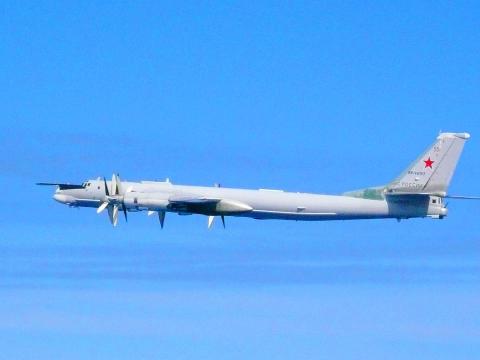South Korean fighter jets yesterday fired hundreds of warning shots and Japan complained to Moscow after a Russian military aircraft entered airspace claimed by both Seoul and Tokyo.
Seoul said three Russian military planes — two Tu-95 bombers and one A-50 airborne early warning and control aircraft — entered South Korea’s air defense identification zone off its east coast before the A-50 intruded in South Korean airspace.
Seoul defense officials said the Russian reconnaissance aircraft left the area three minutes later, but later returned and entered its airspace again for four minutes.

Photo: Reuters / Joint Staff Office of the Japanese Ministry of Defense
The officials said they responded by scrambling F-15K and KF-16 jets, which first issued warnings and fired flares.
They fired 80 warning shots at the plane during the first breach and 280 rounds during the second, a military official said.
At one point, the South Korean and Russian warplanes were just 1km apart, the official added.
“We are assessing this incident in a very grave manner and will take a much tougher measure if it happens again,” National Security Adviser Chung Eui-yong said, according to a presidential Blue House spokeswoman.
Japan complained to both Moscow and Seoul over the incursion.
“We learned that Russian military planes flying over the Sea of Japan this morning twice violated our airspace near Takeshima,” Japanese Chief Cabinet Secretary Yoshihide Suga told a regular press conference.
“Based on this knowledge, we made strong protests,” he said.
Suga, who said Japan also scrambled military jets, added that South Korea’s response was “extremely regrettable.”
However, the Blue House said the disputed islets were an “integral part” of South Korean territory “historically, geographically and under international law.”
Russia denied any breaches, saying that Seoul’s complaint was based on an “arbitrarily established” air defense identification zone that Moscow did not recognize.
“It was not the first time that South Korean pilots tried to unsuccessfully interfere with the flights of the Russian aviation forces above the neutral waters of the Sea of Japan,” the Russian Ministry of Defense said in a statement.
“Such ‘zones’ are recognized by neither international law nor Russia,” it said, adding that Moscow had repeatedly informed Seoul about it.
Russia later released a separate statement, saying Russian and Chinese long-range planes had staged a “first joint patrol mission in the Asia-Pacific region” to “deepen and develop Russian-Chinese relations.”
“Both countries acted in strict accordance with international law,” the ministry said in the statement, adding that the event was “not aimed against third countries.”
Chinese Ministry of Foreign Affairs spokeswoman Hua Chunying (華春瑩) said that South Korea’s air defense identification zone is not a territorial airspace and all countries enjoy freedom of movement there.

AIR SUPPORT: The Ministry of National Defense thanked the US for the delivery, adding that it was an indicator of the White House’s commitment to the Taiwan Relations Act Deputy Minister of National Defense Po Horng-huei (柏鴻輝) and Representative to the US Alexander Yui on Friday attended a delivery ceremony for the first of Taiwan’s long-awaited 66 F-16C/D Block 70 jets at a Lockheed Martin Corp factory in Greenville, South Carolina. “We are so proud to be the global home of the F-16 and to support Taiwan’s air defense capabilities,” US Representative William Timmons wrote on X, alongside a photograph of Taiwanese and US officials at the event. The F-16C/D Block 70 jets Taiwan ordered have the same capabilities as aircraft that had been upgraded to F-16Vs. The batch of Lockheed Martin

US President Donald Trump yesterday announced sweeping "reciprocal tariffs" on US trading partners, including a 32 percent tax on goods from Taiwan that is set to take effect on Wednesday. At a Rose Garden event, Trump declared a 10 percent baseline tax on imports from all countries, with the White House saying it would take effect on Saturday. Countries with larger trade surpluses with the US would face higher duties beginning on Wednesday, including Taiwan (32 percent), China (34 percent), Japan (24 percent), South Korea (25 percent), Vietnam (46 percent) and Thailand (36 percent). Canada and Mexico, the two largest US trading

GRIDLOCK: The National Fire Agency’s Special Search and Rescue team is on standby to travel to the countries to help out with the rescue effort A powerful earthquake rocked Myanmar and neighboring Thailand yesterday, killing at least three people in Bangkok and burying dozens when a high-rise building under construction collapsed. Footage shared on social media from Myanmar’s second-largest city showed widespread destruction, raising fears that many were trapped under the rubble or killed. The magnitude 7.7 earthquake, with an epicenter near Mandalay in Myanmar, struck at midday and was followed by a strong magnitude 6.4 aftershock. The extent of death, injury and destruction — especially in Myanmar, which is embroiled in a civil war and where information is tightly controlled at the best of times —

China's military today said it began joint army, navy and rocket force exercises around Taiwan to "serve as a stern warning and powerful deterrent against Taiwanese independence," calling President William Lai (賴清德) a "parasite." The exercises come after Lai called Beijing a "foreign hostile force" last month. More than 10 Chinese military ships approached close to Taiwan's 24 nautical mile (44.4km) contiguous zone this morning and Taiwan sent its own warships to respond, two senior Taiwanese officials said. Taiwan has not yet detected any live fire by the Chinese military so far, one of the officials said. The drills took place after US Secretary